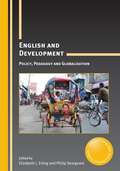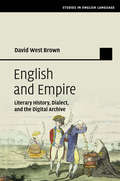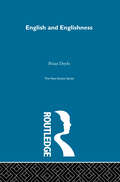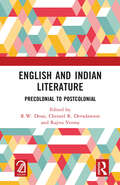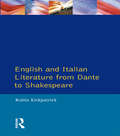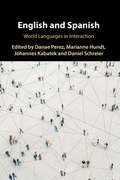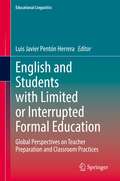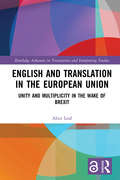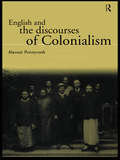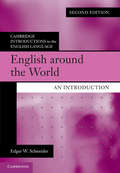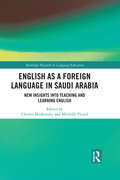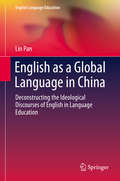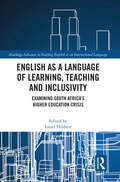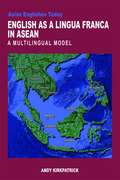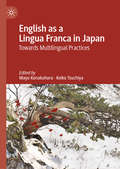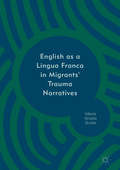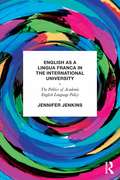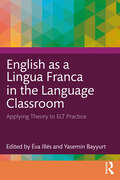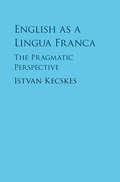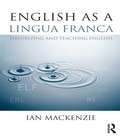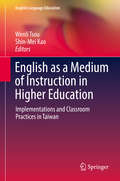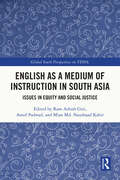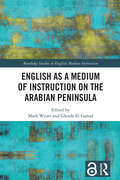- Table View
- List View
English and Development
by Philip Seargeant Elizabeth J. ErlingThis book investigates the relationship between English and personal and national development, as this is both discursively promoted (particularly through language policy) and practically realized in developing societies. It addresses the effects that the increased use of English and the promotion of English-language education are having in developmental contexts, and their impact on broader educational issues, on local language ecologies and on questions of cultural identity. It investigates these issues by drawing together a series of original examinations and case studies by a range of leading scholars working in this burgeoning field. The chapters focus on a variety of contexts from around the world, and the volume as a whole surveys and critiques the positioning and influence of English as a catalyst for development in the 21st century.
English and Empire: Literary History, Dialect, and the Digital Archive (Studies in English Language)
by David West BrownCombining statistical modelling and archival study, English and Empire investigates how African diasporic, Chinese, and Indian characters have been voiced in British fiction and drama produced between 1768 and 1929. The analysis connects patterns of linguistic representation to changes in the imperial political economy, to evolving language ideologies that circulate in the Anglophone world, and to shifts in sociocultural anxieties that crosscut race and empire. In carrying out his investigation, David West Brown makes the case for a methodological approach that links the distant (quantitative) and close (qualitative) reading of diverse digital artefacts. Taking an interdisciplinary approach, the book will appeal to a variety of scholars and students including sociolinguists interested in historical language variation, as well as literary scholars interested in postcolonial studies and the digital humanities.
English and Englishness (New Accents)
by Brian DoyleFirst published in 2002. Routledge is an imprint of Taylor & Francis, an informa company.
English and Indian Literature: Precolonial to Postcolonial
by G. K. DasWritten in the memory of Professor G.K. Das and divided into three sections, this book takes on special significance as India reflects on the ever-changing prospects ahead of the first seventy-five years of independence.The subject matter in this book outlines the relationship between texts and the larger cultural context that they shape (and that, in turn, shapes them). It also presents a comparison of the relationship between events and the written word, or between lines of inquiry and the various kinds of writing that articulate them. The first section discusses British and Indian writers of the precolonial and colonial periods. The essays in the second section reflect on the question: Does the emergent nation-state seem at all like the visions that presaged it, or does it increasingly resemble the imperialistic nightmare that it seeks to replace? Finally, the last section explores the relationship between literature and human nature and also discusses the framing discourse on literature and the environment. The collection closes with a previously unpublished essay by Professor Das that brings to the forefront one of the most urgent global issues of today – the troubling relationship between humanity and an ecologically fragile environment within which it functions.Print edition not for sale in South Asia (India, Sri Lanka, Nepal, Bangladesh, Pakistan or Bhutan)
English and Italian Literature From Dante to Shakespeare: A Study of Source, Analogue and Divergence (Longman Medieval and Renaissance Library)
by Robin KirkpatrickThis is the first comprehensive critical comparison of English and Italian literature from the three centuries from Dante to Shakespeare. It begins by examining Chaucer's relationship with Dante, Petrarch and Boccaccio, and then looks at similar relationships within the areas of humanist education, lyric poetry, the epic, theatrical comedy, the short story and the pastoral drama. It provides a detailed comparison of major works from both traditions including descriptive and critical readings of Italian works. It shows why English writers valued such works and demonstrates the ways in which they departed from or tried to outdo the Italian original. Assuming no prior knowledge of Italy or Italian literary history, this book introduces the student and general reader to one of the most important and fascinating phases in European literary history.
English and Spanish: World Languages in Interaction
by Marianne Hundt Daniel Schreier Danae Perez Johannes KabatekThis volume compares the evolution and current status of two of the world's major languages, English and Spanish. Parallel chapters trace the emergence of Global English and Spanish and their current status, covering aspects such as language and dialect contact, language typology, norm development in pluricentric languages, and identity construction. Case studies look into the use of English and Spanish on the internet, investigate mixed and alternating lects, as well as ongoing change in Spanish-speaking minorities in the US. The volume thus contributes to current theoretical debates and provides fresh empirical data. While offering an in-depth treatment of the evolution of English and Spanish to the reader, this book introduces the driving factors and the effects of the emergence of world languages in general and is relevant for researchers and students of sociolinguistics, historical linguistics, and typology alike.
English and Students with Limited or Interrupted Formal Education: Global Perspectives on Teacher Preparation and Classroom Practices (Educational Linguistics #54)
by Luis Javier Pentón HerreraThis book examines students with limited or interrupted education (SLIFE) in the context of English learners and teacher preparation courses from a cultural and social lens. The book is divided into five parts. Part I frames the conversation and contributions in this edited volume; Part II provides an overview of SLIFE, Part III focuses on teacher preparation programs, Part IV discusses the challenges faced by SLIFE in K-12 learning environments and Part V examines SLIFE in adult learning environments. This book is unique in that it offers practical instructional tools to educators, thus helping to bridge theory and practice. Moreover, it retains a special focus on K-12 and adult SLIFE and has an inclusive and international perspective, which includes a novel theoretical framework to support the mental, emotional, and instructional needs of LGBTQ+ refugee students. The book is of interest to teacher educators, in-service and pre-service teachers, English literacy educators, graduate students, tutors, facilitators, instructors, and administrators working in organizations serving SLIFE in K-12 and adult learning environments.
English and Translation in the European Union: Unity and Multiplicity in the Wake of Brexit (Routledge Advances in Translation and Interpreting Studies)
by Alice LealThis book explores the growing tension between multilingualism and monolingualism in the European Union in the wake of Brexit, underpinned by the interplay between the rise of English as a lingua franca and the effacement of translations in EU institutions, bodies and agencies. English and Translation in the European Union draws on an interdisciplinary approach, highlighting insights from applied linguistics and sociolinguistics, translation studies, philosophy of language and political theory, while also looking at official documents and online resources, most of which are increasingly produced in English and not translated at all – and the ones which are translated into other languages are not labelled as translations. In analysing this data, Alice Leal explores issues around language hierarchy and the growing difficulty in reconciling the EU’s approach to promoting multilingualism while fostering monolingualism in practice through the diffusion of English as a lingua franca, as well as questions around authenticity in the translation process and the boundaries between source and target texts. The volume also looks ahead to the implications of Brexit for this tension, while proposing potential ways forward, encapsulated in the language turn, the translation turn and the transcultural turn for the EU. Offering unique insights into contemporary debates in the humanities, this book will be of interest to scholars in translation studies, applied linguistics and sociolinguistics, philosophy and political theory.
English and the Discourses of Colonialism (The Politics of Language)
by Alastair PennycookEnglish and the Discourses of Colonialism opens with the British departure from Hong Kong marking the end of British colonialism. Yet Alastair Pennycook argues that this dramatic exit masks the crucial issue that the traces left by colonialism run deep.This challenging and provocative book looks particularly at English, English language teaching, and colonialism. It reveals how the practice of colonialism permeated the cultures and discourses of both the colonial and colonized nations, the effects of which are still evident today. Pennycook explores the extent to which English is, as commonly assumed, a language of neutrality and global communication, and to what extent it is, by contrast, a language laden with meanings and still weighed down with colonial discourses that have come to adhere to it.Travel writing, newspaper articles and popular books on English, are all referred to, as well as personal experiences and interviews with learners of English in India, Malaysia, China and Australia. Pennycook concludes by appealing to postcolonial writing, to create a politics of opposition and dislodge the discourses of colonialism from English.
English around the World
by Edgar W. SchneiderThe global spread of English has had widespread linguistic, social and cultural implications, affecting the lives of millions of people around the world. This textbook provides a lively and accessible introduction to world Englishes, describing varieties used in places as broad-ranging as America, Jamaica, Australia, Africa and Asia, and setting them within their historical and social contexts. Students are guided through the material with chapter previews and summaries, maps, timelines, lists of key terms, discussion questions and exercises, and a comprehensive glossary, helping them to understand, analyse and compare different varieties of English, and apply descriptive terminology. The book is accompanied by a useful web site, containing textual and audio examples of the varieties introduced in the text, and links to related sources of interest. Providing essential knowledge and skills for those embarking on the study of world Englishes, this is set to become the leading introduction to the subject.
English around the World: An Introduction (Cambridge Introductions to the English Language)
by Edgar W. SchneiderThe global spread of English has had widespread linguistic, social, and cultural implications, affecting the lives of millions of people around the world. This textbook provides a lively and accessible introduction to world Englishes, describing varieties used in regions as diverse as America, the Caribbean, Australia, Africa, and Asia, and setting them within their historical and social contexts. Students are guided through the material with chapter summaries, discussion questions and exercises, and a comprehensive glossary, helping them to understand different varieties of English. The second edition is substantially updated, including new sections on English as a Lingua Franca, blurring boundaries, and research methods and resources. The book is accompanied by a useful website, containing textual and audio examples of the varieties introduced in the text. Providing essential knowledge and skills for those embarking on the study of world Englishes, this is a timely update of the leading introduction to the subject.
English as a Contact Language
by Marianne Hundt Daniel SchreierRecent developments in contact linguistics suggest considerable overlap of branches such as historical linguistics, variationist sociolinguistics, pidgin/creole linguistics, language acquisition, etc. This book highlights the complexity of contact-induced language change throughout the history of English by bringing together cutting-edge research from these fields. Special focus is on recent debates surrounding substratal influence in earlier forms of English (particularly Celtic influence in Old English), on language shift processes (the formation of Irish and overseas varieties) but also on dialects in contact, the contact origins of Standard English, the notion of new epicentres in World English, the role of children and adults in language change as well as transfer and language learning. With contributions from leading experts, the book offers fresh and exciting perspectives for research and is at the same time an up-to-date overview of the state of the art in the respective fields.
English as a Foreign Language in Saudi Arabia: New Insights into Teaching and Learning English (Routledge Research in Language Education)
by Christo Moskovsky Michelle PicardEnglish as a Foreign Language in Saudi Arabia: New Insights into Teaching and Learning English offers a detailed discussion of key aspects of teaching and learning English in the Saudi context and offers a comprehensive overview of related research authored or co-authored by Saudi researchers. It provides readers with an understanding of the unique cultural, linguistic, and historical context of English in Saudi Arabia—with a focus on the principal factors that may influence successful teaching and learning of English in this country. Uniquely, the book looks separately at issues pertaining to in-country English learning and learners, and those pertaining to in-country English teaching and teachers. The volume also explores issues concerning Saudi learners and teachers in overseas contexts. Lastly, the book touches on the future of English as a Foreign Language and TESOL in Saudi Arabia and its implications for the field.
English as a Global Language in China
by Lin PanThis book offers insight into the spread and impact of English language education in China within China's broader educational, social, economic and political changes. The author's critical perspective informs readers on the connections between language education and political ideologies in the context of globalizing China. The discussion of the implications concerning language education is of interest for current and future language policy makers, language educators and learners. Including both diachronic and synchronic accounts or China's language education policy, this volume highlights how China as a modern nation-state has been seeking a more central position globally, and the role that English education and the promotion of such education played in that effort in recent decades.
English as a Language of Learning, Teaching and Inclusivity: Examining South Africa’s Higher Education Crisis (Routledge Advances in Teaching English as an International Language Series)
by Liesel HibbertHibbert explores South Africa’s higher education crisis utilising case studies and first-hand experiences with English as the language of instruction. The historical overview provides a framework with which to understand the complicated nature of using English as a language of instruction in South Africa, past and present. Student narratives are presented to illustrate mainly breakthroughs, but also challenges. An overview is provided, of imported English teaching methodologies and how they have emerged and developed in the local educational system over decades. It is demonstrated how these methodologies relate to socio-economic and political events and trends at each juncture. By applying defamiliarisation as a research method of investigation, students’ translanguaging struggles are recorded and discussed, both pre-pandemic and in the pandemic period. The experiences of non-monolingual English-speaking staff and students, and of local English/African language bilinguals is foregrounded, as they are by far the majority in South African higher education and schools. The relevance of the experiences and learning paths of those staff and students is enhanced. This book aids lecturers across disciplines and English language facilitators in the improvement of English acquisition curricula through exposure to arguments, case studies and learning path narratives in this volume, and prompts and inspires researchers to develop further theories and experiments in their own context.
English as a Lingua Franca in ASEAN
by Andy KirkpatrickThe lingua franca role of English, coupled with its status as the official langu
English as a Lingua Franca in Japan: Towards Multilingual Practices
by Keiko Tsuchiya Mayu KonakaharaThis edited book examines the phenomenon of English as a Lingua Franca (ELF) in the Japanese context, using multilingualism as a lens through which to explore language practices and attitudes in what is traditionally viewed as a monolingual, monocultural setting. The authors cover a broad spectrum of topics within this theme, including language education policies, the nature of ELF communication in both academic and business settings, users’ and learners’ perceptions of ELF, and the pedagogy to foster ELF-oriented attitudes. Teaching and learning practices are reconsidered from ELF and multilingual perspectives, shifting the focus from the conformity to native-speaker norms to ELF users’ creative use of multilingual resources. This book is a key resource for advancing ELF study and research in Japan, and it will also be of interest to students and scholars studying multilingualism and World Englishes in other global contexts.
English as a Lingua Franca in Migrants' Trauma Narratives
by Maria Grazia GuidoThis book examines how trauma is experienced and narrated differently across languages and cultures, drawing on rich ethnographic case studies and a novel cognitive-linguistic approach to analyse the variations of English as a Lingua Franca (ELF) used in the narratives of West-African migrants and refugees in the course of intercultural encounters with Italian experts from domain-specific fields of discourse (including legal, medical, religious and cultural professionals). It examines the ways in which such experts interpret the migrants’ trauma narratives by applying discourse conventions from within their communities of practice, as well as their own native linguacultural norms. It argues persuasively for the development of a ‘hybrid ELF mode’ of intercultural communication to be used by experts in charge of unequal encounters in specialized migration contexts that can accommodate different culture-bound categorizations of trauma. This timely and important work will appeal in particular to students and scholars of applied linguistics, discourse analysis, cognitive linguistics, intercultural communication, pragmalinguistics, migration studies and healthcare communication.
English as a Lingua Franca in the International University: The Politics of Academic English Language Policy
by Jennifer JenkinsIn this book, Jennifer Jenkins, one of the leading proponents of English as a Lingua Franca, explores current academic English language policy in higher education around the world. Universities around the world are increasingly presenting themselves as "international" but their English language policies do not necessarily reflect this, even as the diversity of their student bodies grows. While there have been a number of attempts to explore the implications of this diversity from a cultural perspective, little has been said from the linguistic point of view, and in particular, about the implications for what kind(s) of English are appropriate for English lingua franca communication in international higher education. Throughout the book Jenkins considers the policies of English language universities in terms of the language attitudes and ideologies of university management and staff globally, and of international students in a UK setting. The book concludes by considering the implications for current policies and practices, and what is needed in order for universities to bring themselves in line linguistically with the international status they claim. English as a Lingua Franca in the International University is an essential read for researchers and postgraduate students working in the areas of Global Englishes, English as a Lingua Franca and English for Academic Purposes.
English as a Lingua Franca in the Language Classroom: Applying Theory to ELT Practice
by Yasemin Bayyurt Éva IllésThis new text is a guide for understanding, envisioning, and acting on the lessons of English as a Lingua Franca (ELF) research in English Language Teaching (ELT) classrooms. The volume is the result of the cooperation of an international team that includes members involved in research, teacher education, and classroom practice. This collection bridges theory, methodology, and real-world application of ELF research for the first time. Chapters offer a variety of practical perspectives and support teachers to better prepare their students for the reality of how the English language is used around the world today. With close attention to the nuts and bolts of teaching – as well as useful features for further investigation, discussion, and application – this book will be a helpful, practical resource for current and prospective English language teachers, teacher trainers and mentors, and curriculum designers.
English as a Lingua Franca: The Pragmatic Perspective
by Istvan KecskesEnglish as a Lingua Franca (ELF) is a term used to describe the use of English as a common language for communication between speakers whose first language is not English. Providing a unique and original perspective on this subject, Istvan Kecskes explains the language behaviour of ELF speakers, through the lens of Gricean pragmatics. This study successfully brings together the main viewpoints of the Gricean paradigm into ELF research, to discuss and better understand the nature of ELF interactions, as well as explaining how Gricean pragmatics can benefit from investigating and analysing ELF. Each chapter presents intriguing ideas that put existing knowledge into a new perspective, such as interactional competence, intention, implicatures, the semantics-pragmatics interface, and modality. New terms and viewpoints such as language use mode, deliberate creativity, temporary extension of the system, emergent common ground and modality continuum are introduced into the ELF debate.
English as a Lingua Franca: Theorizing and teaching English
by Ian MackenzieEnglish as a Lingua Franca: Theorizing and Teaching English examines the English used among non-native speakers around the world today and its relation to English as a native language, as well as the implications for English language teaching. Challenging and incisive, this book analyses positive and negative accounts of English as a lingua franca, and its linguistic features, within the context of: native and World Englishes multilingualism and intercultural communication sociolinguistic issues including accent and identity classroom teaching and learning English as a Lingua Franca is a useful guide for teachers and trainee teachers, and will be essential reading for advanced students and linguists concerned with multilingualism, language contact, language learning, language change, and the place of English in the world today.
English as a Medium of Instruction in Higher Education
by Shin-Mei Kao Wenli TsouThis book presents the multiple facets of English as a Medium of Instruction (EMI) in higher education across various academic disciplines, an area that is expected to grow constantly in response to the competitive global higher education market. The studies presented were conducted in various EMI classrooms, with data collected from observing and documenting the teaching activities, and from interviewing or surveying EMI participants. Through data analysis and synthesis, cases across disciplines - from engineering, science, technology, business, social science, medical science, design and arts, to tourism and leisure service sectors - are used to illustrate the various EMI curriculum designs and classroom practices. Although the cases described are limited to Taiwanese institutions, the book bridges the gap between planning and executing EMI programs across academic domains for policy makers, administrators, content teachers, and teacher trainers throughout Asia.
English as a Medium of Instruction in South Asia: Issues in Equity and Social Justice (Global South Perspectives on TESOL)
by Ram Ashish Giri Amol Padwad Kabir, Mian Md. NaushaadThis book examines the ‘English mania phenomenon’ and the complex circumstances of adopting English Medium Instruction (EMI) by South Asian education systems and the effect of an uneven distribution of resources on the already under-resourced countries in the region. Chapters explore linguistic, social, and economic injustices by using an analytic-critical approach to examinations of the place, role, provisions, and practices of EMI in specific English language teaching (ELT) contexts. The book consequently advocates for the wholescale reform of a system, which, the authors argue, is unjust. Ultimately, the book explores socio-cultural, poststructuralist, and English linguistic imperialism theories to contribute a South Asian perspective on the controversy surrounding EMI and examine its role within a wider global discourse on equity and social justice. Critically examining the spread of English in South Asia, this book will be of relevance to researchers, scholars, and postgraduate students in applied linguistics, language education, TESOL, and sociolinguistics.
English as a Medium of Instruction on the Arabian Peninsula (Routledge Studies in English-Medium Instruction)
by Mark Wyatt Glenda El GamalFocusing on English as a Medium of Instruction (EMI) in the Arab Gulf states, the authors consider both sociolinguistic and pedagogical perspectives, and explore practical implications. This edited volume features chapters covering how teachers are negotiating the linguistic challenges posed by EMI; issues of ownership, choice and agency; the scaffolding of academic literacies; how to support the development of content teachers’ pedagogical content knowledge in EMI settings as well as the benefits of a bilingual education. Chapter authors all have extensive local experience that they draw upon reflectively in their writing. Policy-makers, teachers and teacher educators wondering how they can best balance the need to develop competence in English in students of all ages on the Arabian Peninsula in a globalizing world, together with the concern to nurture Arabic language, culture and identity, will gain rich insights from this book. Postgraduates and researchers exploring issues surrounding EMI, both locally and internationally, will benefit from the arguments presented in this volume.
